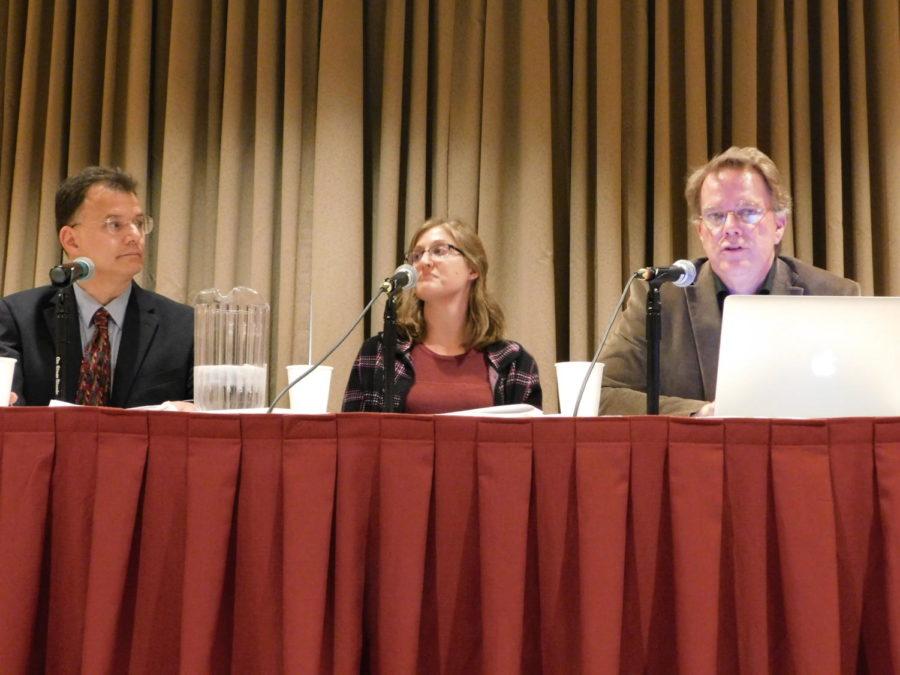- App Content
- App Content / News
- News
- News / Politics And Administration
- News / Politics And Administration / State
Iowa ACLU director and political science professor discuss recent Supreme Court rulings
Left to right panelists Clark Wolf, Rita Bettis and Dirk Deam talk about the past year’s main debates in the supreme court room.
October 11, 2017
Panelists discussed recent Supreme Court rulings and their impact on citizens, including gerrymandering and discrimination, Wednesday at 7 p.m. in the Memorial Union.
The panel included American Civil Liberties Union (ACLU) of Iowa Legal Director, Rita Bettis and Dirk Deam, senior lecturer in political science. The moderator was Iowa State Bioethics Program Director and philosophy professor Clark Wolf. Wolf also moderated for last year’s panel.
“This has become an annual event and I look forward to it every year. It’s a wonderful opportunity to discuss important events with erudite and particulate colleagues,” Wolf said.
Some of the highlighted supreme court ruling topics include Gerrymandering, the travel ban, partisan politics and discrimination.
The first topic up for discussion was President Donald Trump’s travel ban. Bettis went through a thorough history and explanation of the travel ban, which she refers to as the muslim ban.
“Here’s what the order did, it affected seven countries originally and those countries were Iran, Iraq, Libya, Somalia, Sudan, Syria and Yemen. The combined populations of those countries are 97 percent Muslim,” said Bettis. “And if all that doesn’t convince you that it’s a muslim ban, the executive order had an exemption for minority religions from those countries. In other words, only Muslims are subject to the travel ban.”
Bettis said the ACLU went to court immediately and the order was shut down in a matter of 30 hours.
“It was appealed to the 4th circuit court of appeals, which agreed that the ban – and I have the language because it’s wonderful – ‘drips with religious intolerance and discrimination,’” Bettis said.
The conversation moved from the travel ban to a voting district conflict called gerrymandering.
Gerrymandering is defined as manipulation of the boundaries of (an electoral constituency) so as to favor one party or class.
In layman’s terms, gerrymandering is changing voting district lines to increase the likelihood a party will win a certain voting area, based on financial status, race and other demographics.
Bettis used drawings to further explain gerrymandering.
The unmanipulated voting district had a roughly square like shape, while her example of a gerrymandered voting district had jagged lines and peninsulas of the district.
There are two main forms of gerrymandering; cracking and packing.
“Cracking is the idea where you take a voting block and you crack it. You take voters that are in it and you move them into other districts so that their vote is diluted by the presence of people in another party, essentially so their votes don’t matter,” said Deam. “Packing is a process when you take people and put them into a group that is already going to reliably vote a certain way so their votes won’t count as much.”
Another topic discussed was discrimination in the cases of religion as well as sexual orientation.
The examples used were a Colorado bakery that refused the service of a wedding cake for a same sex marriage, and a christian based school being removed from a list of potential recipients of a publicly funded grant to provide safe playgrounds on the basis of their religious status.
“We have long ago settled that if you want to avail yourself of the benefits of the public marketplace, if you want to be a seller that’s fine. But we’ve always recognized that non-discrimination provisions apply,” said Bettis.
In regards to the Colorado bakery, Masterpiece, and their unwillingness to serve the couple based on their sexual orientation, Bettis said the law was very clear.
“You can’t discriminate on these very limited basis that we’ve recognized deserve protection, are in need of protection based on race, sexual orientation, gender identity, because of the history of discrimination,” Bettis said. “The couple shouldn’t have been turned away from a business based on sexual orientation and it’s against the law. Plain and simple.”
Besides recent supreme court rulings, they also discussed shifts in the balance of the court caused by the death of Justice Antonin Scalia and the appointment of Neil Gorsuch.
After the death of Scalia, the supreme court adjudicated a total of 57 cases this last year, which is a record low.
“This court had only eight members from October to April, which affected every aspect of the courts both in pace and practice,” Wolf said. “They decided less cases this year than any year in previous memory, deciding only 57 cases this year.”
Scalia’s passing not only affected the quantity of cases decided, but also affected which cases the supreme court would hear. The supreme court avoided cases that could potentially end in a tie, as there was no longer an odd number of judges.
“The gap in the court – the loss of justice Scalia affected other things as well. The court accepted different cases for review,” Wolf said. “They avoided cases that looked like they were going to generate a four/four tie, and it’s not often recognized but this was a strategic move that benefited some and had costs for other members of the court but it was the choice they made.”






